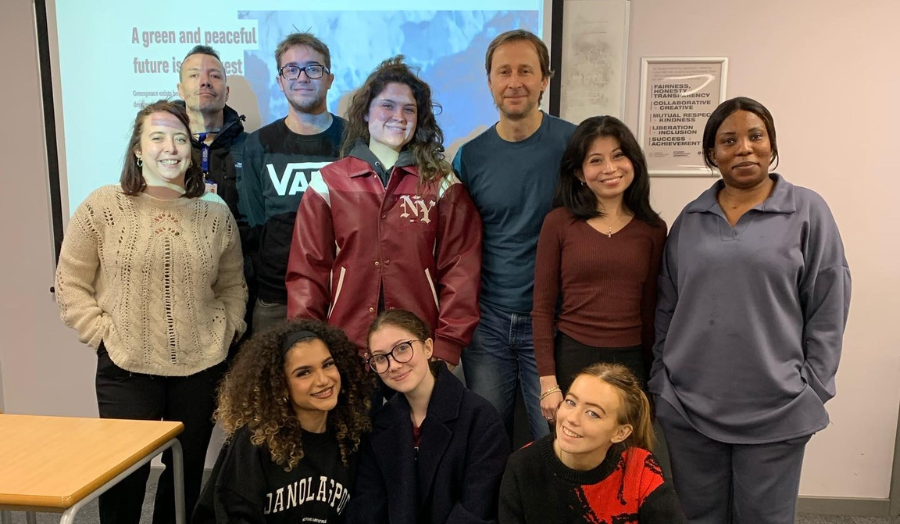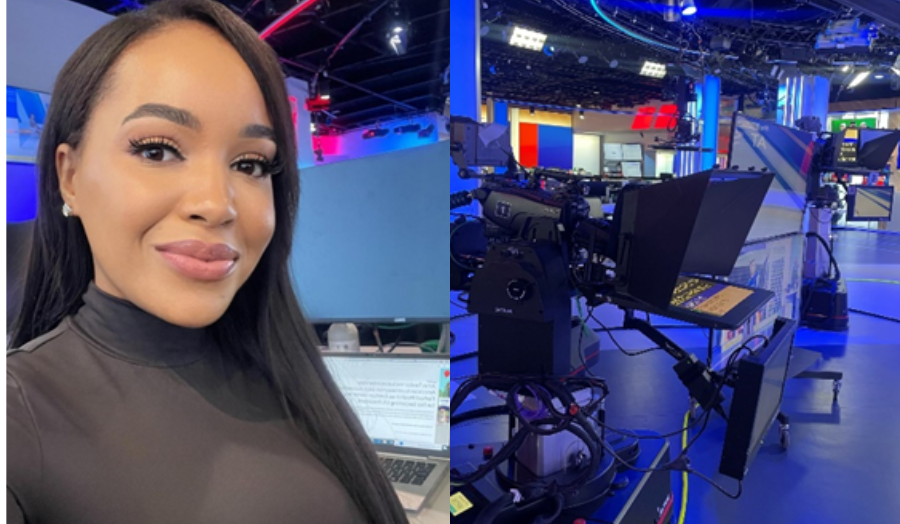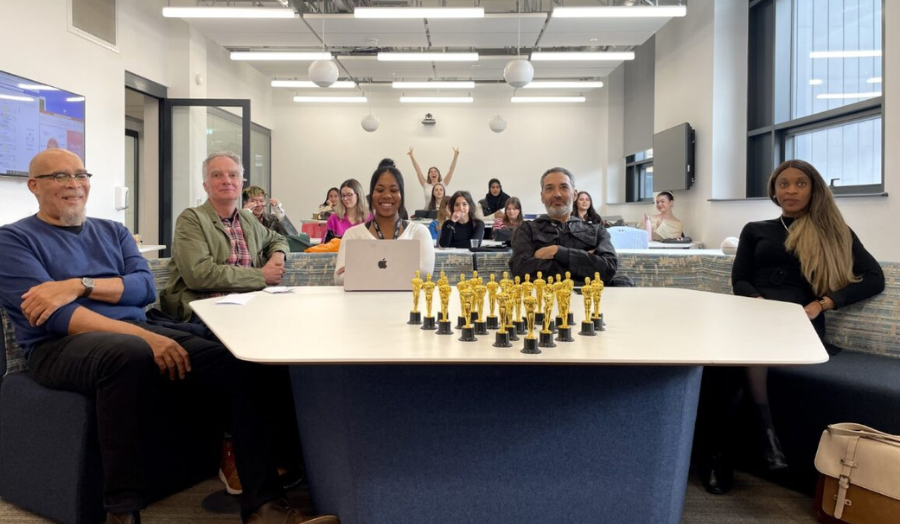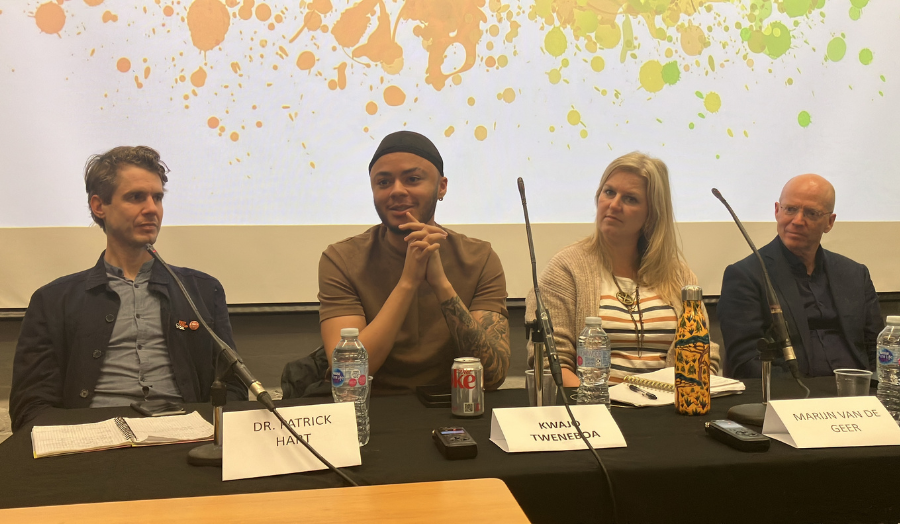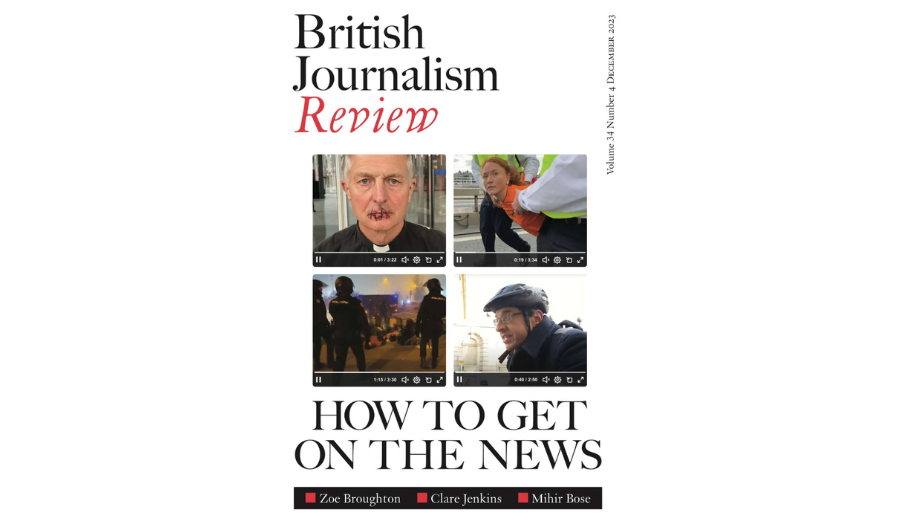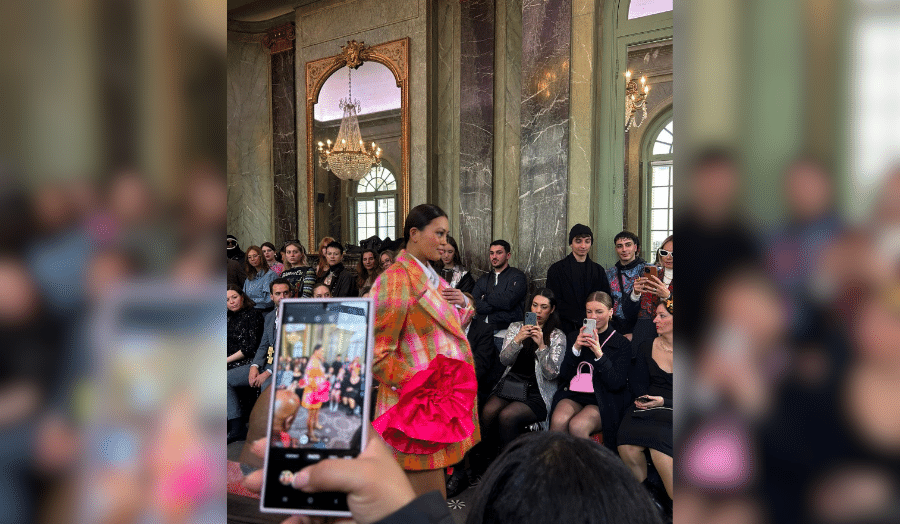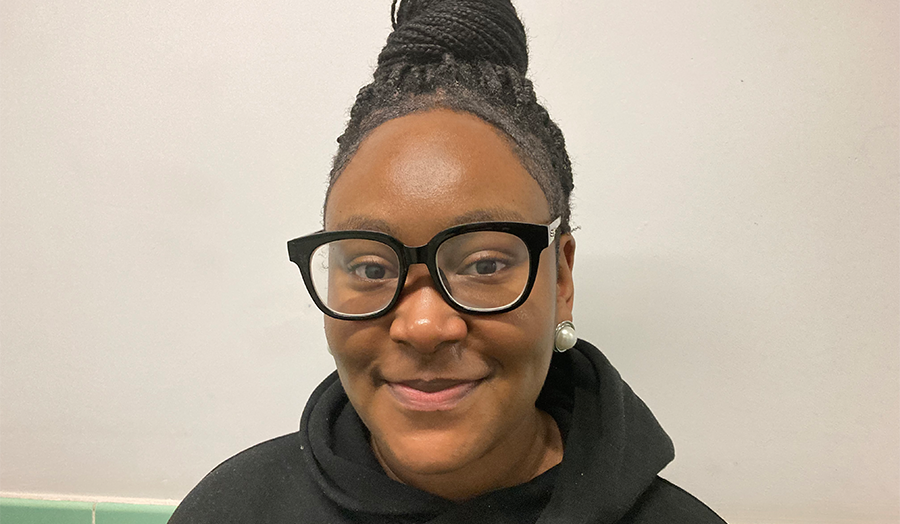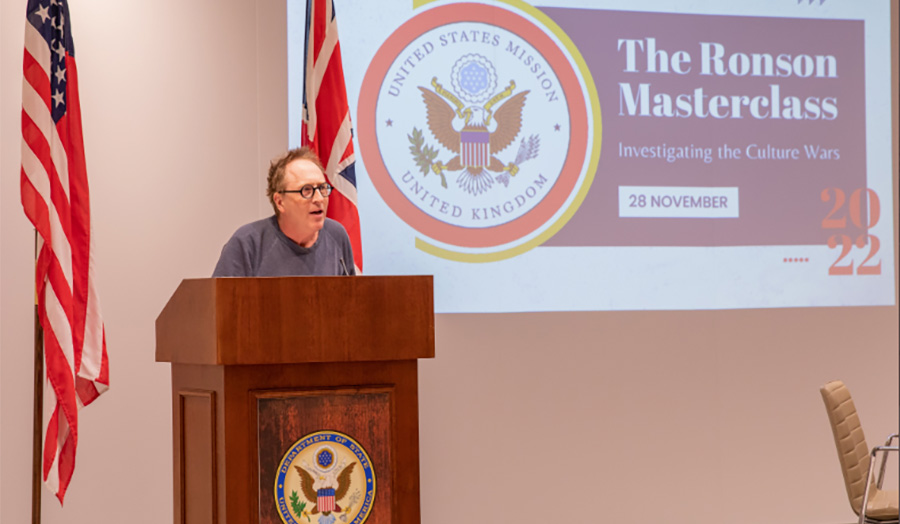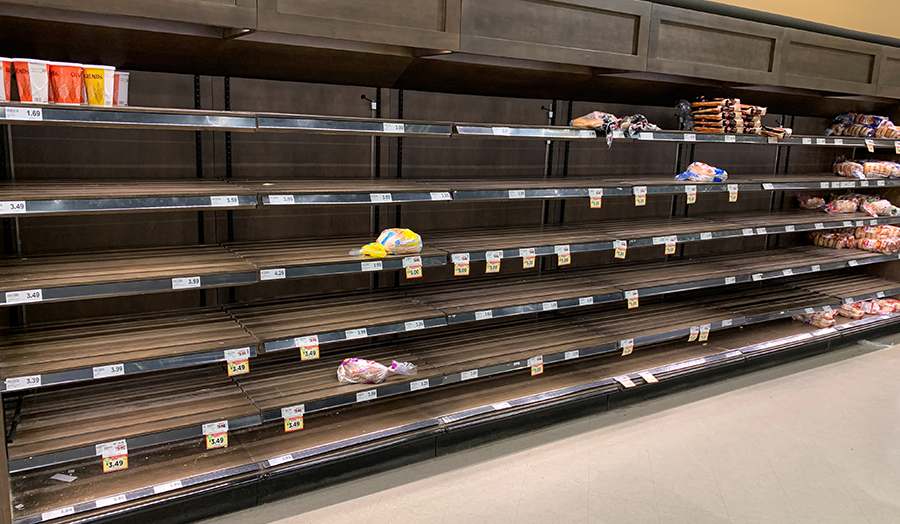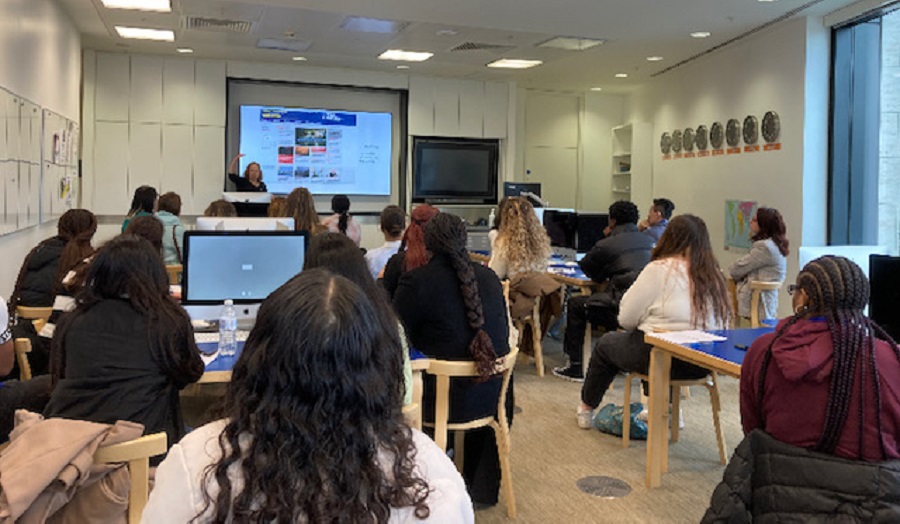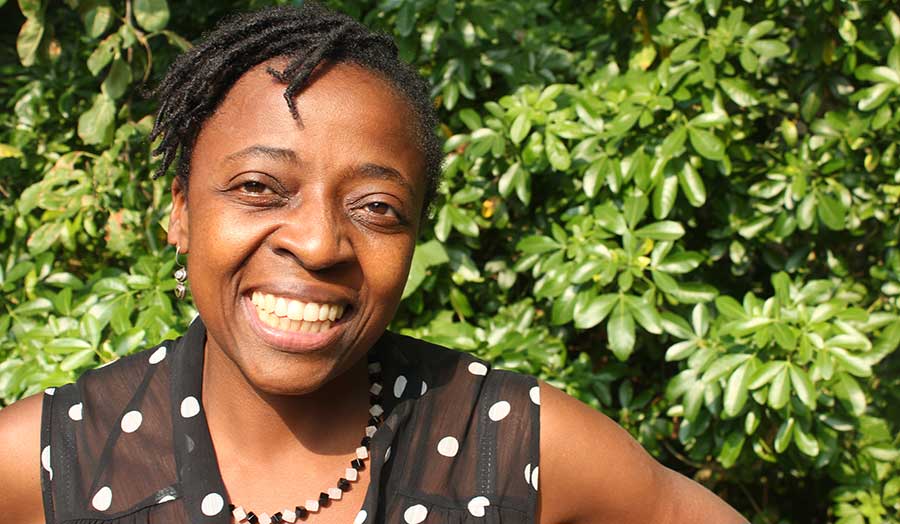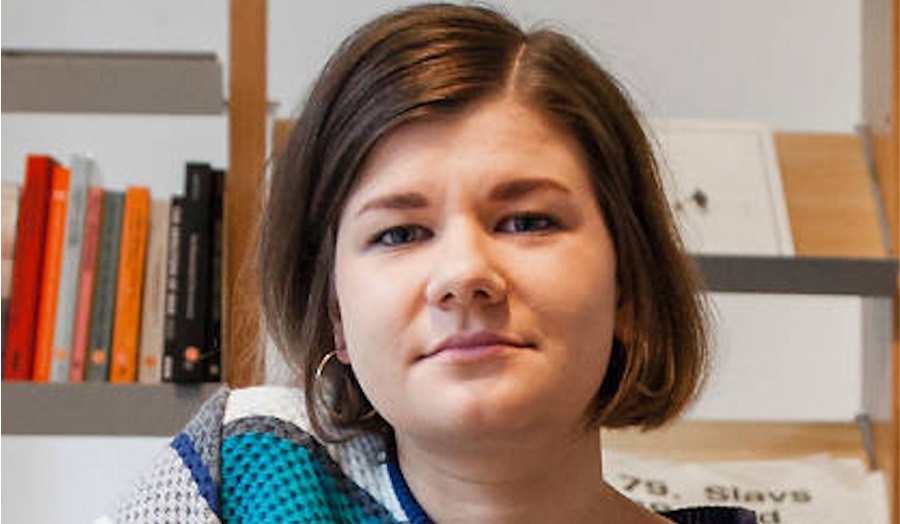Apply for this course
Please select when you would like to start:
If you're a UK applicant wanting to study full-time starting in September, you must apply via UCAS unless otherwise specified. If you're an international applicant wanting to study full-time, you can choose to apply via UCAS or directly to the University.
If you're applying for part-time study, you should apply directly to the University. If you require a Student visa, please be aware that you will not be able to study as a part-time student at undergraduate level.
If you're applying for a degree starting in January/February, you can apply directly to the University.
Apply to us for January 2025
If you're a UK student or an EU student with settled or pre-settled status applying for January 2025, you can simply call our hotline on 0800 032 4441 or complete our fast-track online application form.
Why study this course?
Channel your talent for writing, your instinct for seeking out the truth and your ability to engage an audience with a compelling story through this exceptional journalism degree in London. You’ll learn how to survive in a rapidly changing industry, cover breaking news in our state-of-the-art newsroom and develop a range of journalistic writing for different media channels and genres.
Keep up-to-date with the latest news from our journalism staff, students and alumni by following their Instagram and Holloway Express pages. You can also follow their X page.
Take part in work placement opportunities to give your career a head start
Our students have had placements at media organisations including BBC Radio 1, Your Media London, Islington Gazette, Hayes FM, Business In The Community, Bracknell News, October Films, sport.co.uk, Bliss, Press Association, Sunday Times, ITN, Cambridge Evening News and the Daily Mail
Learn all the skills you need to become a great journalist
Learning to use both the journalist’s techniques for gathering and telling stories and the academic’s skills in analysing and marshalling arguments will leave you with a strong portfolio to enter the marketplace
Discover the news centres around London and enrich your studies
You’ll have the chance to visit newspapers, TV studios and the places where news is made
Course modules
The modules listed below are for the academic year 2024/25 and represent the course modules at this time. Modules and module details (including, but not limited to, location and time) are subject to change over time.
Year* 1 modules
Year 2 modules
Year 3 modules
Audio and Video Techniques
This module currently runs:spring semester - Wednesday morning
(core, 15 credits)
The module will be taught by a programme of weekly sessions, comprising a three-hour block for each of the 12 weeks in which it runs.
Learning and teaching strategy will be based on an interactive, coaching model. Sessions will mix tutor instruction with blended learning, in-class writing workshops, discussions and debate, with students required to do weekly reporting and writing exercises out of class as well as during sessions, where coaching will supplement group work.
This module introduces students to the practical aspects of multimedia newsgathering through the use of audio and video (including looking at ethical problems) involved in professional recording, newsgathering, collaborating in teams to produce stories, evaluating sources and revising writing.
You will be required to produce news copy in professional formats, which will include online posts using video and audio and the use of mobile technology.
You will develop stories through new media, images, audio, and video. This to include links to Youtube, soundcloud etc, with multimedia elements.
The module will be assessed by two portfolios, using mixed media and written research.
These will test your developing news sense, news gathering and news writing.
Contribution in class will be measured by a journal recording your activity, weekly updated, moderated by tutors at the end of the teaching period
Read full detailsCommunication and image
This module currently runs:spring semester - Tuesday afternoon
(core, 15 credits)
In this module you will be introduced to the foundations of communications and image studies. The module explores different frameworks for understanding communications, and the role of the visual image in media, marketing and communications. It will introduce you to semiotics. You will also have the opportunity to apply your learning in the form of a photographic portfolio that will demonstrate theories of the image. The module combines theory and practice-based learning in a fully integrated way and provides a foundation to key theoretical ideas.
The module aims to:
• Provide you with an introduction to theories of communication and theories of the image.
• Promote your critical understanding of the role of images in communications, marketing and media.
• Develop your photographic practice and understanding the role of critical theories in media practice.
• Develop and encourage your confidence in the use of appropriate learning, analytical and discursive skills in both oral and written argument, and help you acquire key academic research skills.
Digital Skills
This module currently runs:spring semester - Thursday afternoon
(core, 15 credits)
In this module, you will be introduced to the creative digital skills required for an undergraduate degree and career path in the creative industries, digital media, and journalism.
This digital literacy module provides an introduction to the software and practical skills required to produce a creative online presence and build a professional profile. You will be encouraged to develop your media practice utilising a range of tools and software packages. These skills in image production, for game and web design, desktop publishing and micro-blogging will be utilised in the development and presentation of CV's, promotional materials, posters, and flyers. The work you do on this module will be presented in a portfolio of digital practice and expertise, and you will additionally develop important skills in managing data and media assets in creative digital packages.
You will be introduced to key aspects and notions of employability. You will make use of these skills, knowledge, and understanding to plan and develop your career. You will reflect on your personal attributes, and examine the essential skills demanded of your favoured occupation. You will be encouraged to make use of these skills and knowledge to begin building your professional network and to formally and systematically consider your career development goals and strategies.
You will explore the ways in which digital media has transformed the nature of work and the development of careers. You will be encouraged to employ critical methods in the understanding of and analysis of digital media in the workplace context and explore opportunities for developing digital and media careers.
This module aims to:
• Equip you with the digital skills needed to prepare and present your work in the appropriate manner for your chosen field.
• Develop data and file management skills fundamental to the creative and media industries.
• Develop reflective practices by reviewing the needs of a design brief.
• Build confidence working with digital files, applying a range of document design and editing techniques.
• Allow you to better present your work for its intended audience.
Digital Storytelling
This module currently runs:autumn semester - Thursday morning
(core, 15 credits)
This module is designed to equip journalism students with the knowledge of digital journalistic practices and trends and the skills to produce multi-platform pieces of journalism. It aims to build on your core journalism skills and enable you apply these skills in producing journalism across digital platforms. It also aims to give you a critical perspective on journalism, both in its online and traditional applications, and critically examine how technology affects our profession.
Working alongside the News and Features and Audio and Video Techniques modules, Digital Storytelling will continue to develop your abilities in sourcing, researching, interviewing, producing and editing original stories. You will learn to apply these skills in digital, multimedia storytelling modes.
To accomplish this, in the beginning of the module you will examine the conventions of digital publishing and the different digital elements that make up multimedia journalism – from features such as hyperlinks to interactivity and social media options to immersive storytelling design. You will then examine how journalists combine texts with audio, video, images and other modes of storytelling to produce exciting and compelling stories, and you will practice telling your own stories using these methods.
You will have the chance to fully explore the design on news websites and practice digital publishing, considering how the online environment and online audiences affect how we present texts online, from writing conventions to multimedia elements. You will also investigate how you can use social media as a journalist and a digital publisher.
Finally, you will get a chance to study the outstanding examples of online journalism and develop an understanding of how factors such as monetisation, non-linear and immersive design and audience interaction affect the journalistic editorial and production processes.
In class you will learn through a combination of lectures and practical classes, with weekly reading and practical tasks.
You will be assessed through a website portfolio of multimedia stories and online journal contributions.
History of Journalism in Context
This module currently runs:autumn semester - Tuesday afternoon
(core, 15 credits)
This module introduces students to the history of journalism, honourable and dishonourable, and to the roles it has played and continues to play in society.
Understanding will be underpinned by knowledge of the importance of ethical, public interest journalism in its codified current form, and inspired by journalistic exemplars from previous generations.
Focusing on the UK, but blending wider international perspectives, you will build an understanding of the qualities needed by ethical journalists to taker on vested interests. Particular emphasis will be placed in the importance of diversity in media, its development in the UK over time, and current state, thus reflecting the university’s commitment to decolonisation of curriculum and social justice. This content will be used to develop transferable skills of critical thinking and analysis, crucial to employability.
It will also highlight ethical concerns, and take account of wider, global issues and contexts.
Political accounts, investigations that have transformed lives, human interest stories, arts reviews, in-depth profiles, cartoons, speculative columns, hot gossip, sports, fashion, celebrity… and now, for something completely different! What does it all mean and why do we produce and consume it? By the end of the module, students won’t necessarily have any answers, but they should be able to ask much better questions and have developed critical and analytical skills.
Working together, individually and in small groups, students explore major events and stories, past and present. They develop skills of presentation and analysis, learning when to use academic writing and when the more vivid narrative of journalism can play an equally effective role. In addition, they will explore critically and practically, the techniques used in writing and broadcasting of the past so that they can better develop their own professional capacities in the future.
Discussion, presentations, research, screenings and visits will all play a part in the development of critical thinking skills, which will be workshop-based.
The module will be assessed by three essays and contributions to an online journal, which is moderated by tutors at the end of the year.
Journalism: Perspectives and Ideas
This module currently runs:spring semester - Tuesday morning
(core, 15 credits)
This module introduces students to different ways of interpreting and understanding the journalistic sphere, challenging dominant perspectives to include sociological, political and economic approaches to deconstructing media content in newspapers and their websites, TV and radio news, and social media news feeds.
Understanding will be underpinned by knowledge of media theorists and political/economic philosophy. Students will also be introduced to alternative ways of looking at and understanding news coverage of war, miscarriages of justice and confessional journalism. The value of, and issues arising from, subjectivity in journalism will illuminate and challenge dominant narratives. The role of the so-called Fifth Estate will further expose issues surrounding prevailing power structures influencing journalistic content.
Students will be introduced to ethical and legal considerations throughout to consolidate their grasp of the world of journalism, challenging malpractice and encouraging professional integrity which is committed to the public interest.
The module will take a global perspective in exploring these ideas, challenging the monocultural restraints of UK mainstream media, thus embracing the decolonisation of curriculum values of London Metropolitan University, and reflecting the vibrant international diversity of our cohort.
This content will be used to develop transferable skills of critical thinking and analysis, crucial to employability.
Critical thinking and presentation skills will be enhanced by students working individually, in small groups and contributing to whole group discussions in a workshop format built on discussions, presentations, research, screenings, plus a range of guest speakers.
The module will be assessed by two essays and contributions to an online journal, which is moderated by tutors at the end of the year.
Reporting: News and Features
This module currently runs:autumn semester - Wednesday morning
(core, 15 credits)
This module introduces students to the practical and analytical skills (including looking at ethical problems) involved in professional news writing, newsgathering, collaborating in teams to produce stories, evaluating sources and revising writing.
Students will be required to produce news copy in professional formats, which will include online posts using images, video and audio and the use of mobile technology.
You will research and write a series of news articles and publish them to the class. You will learn newsgathering skills: analysis of reports, press releases and user-generated content; deducing news content from press conferences and announcements (diary items); following up human interest via face-to-face and phone interviews, including vox pops and the death knock; organising a team response to a major event; follow-up stories and case studies; analysing facts and figures to use in sidebar boxes; cultivating contacts and FoI.
You will study contemporary news coverage to develop an understanding of how news stories are reported and created. You will discuss ethical, legal and commercial constraints on journalists and how different genres serve different markets.
Accuracy, subediting, headlines and search engine optimisation will be important, as will developing stories through new media, images, audio, and video. This to include links to Youtube, SoundCloud etc, with multimedia elements.
The module will be assessed by two portfolios, using mixed media, and a timed class exercise. These will test students’ developing news sense, news gathering and news writing.
Contribution in class will be measured by a journal recording the student’s activity, updated weekly, and moderated by tutors at the end of the teaching period
Read full detailsWriting and Research Skills
This module currently runs:autumn semester - Thursday afternoon
(core, 15 credits)
This module will equip students on courses in creative technologies, media and journalism with essential transferrable skills of good writing and also introduce them to basic research and academic writing skills.
This module aims to develop good writing in a variety of ways, focusing on expectations and standards in the professional and academic environments; your studies on this module will include two major elements: good writing principles for your future profession, and academic writing skills for your higher education.
This way, you will first study what makes a good text: from the principles of clarity, brevity and simplicity to developing personal style. You will examine different types of texts, their communicative purposes and expectations in the professional world, as well as structure, narrative and storytelling principles, from emails and blogs to professional reports.
In the second part of this module, you will focus on a crucial skill in higher education: academic research, writing, and referencing. You will learn to search for, review and analyse information in academic and non-academic sources, extract relevant information, and use it to develop and support your argument in academic writing or other forms of presentation. You will examine and practice the specific language of academic writing, the structuring of academic texts and the goals and principles of academic referencing.
In addition, this module will help you develop confidence and creativity in writing, techniques to overcome writer’s block and ‘fear on a blank page’ and working in teams on creative and academics tasks to foster inclusive team-working skills.
In class you will learn through a combination of lectures and practical classes, with weekly writing tasks. You will be assessed through a series of blog posts, a written report and weekly online journal contributions.
Read full detailsJournalism Industry Experience
(core, 15 credits)No module details available
Journalism: Public Interest and Power
(core, 15 credits)This module covers what student journalists need to know about how Britain works and the place of journalism within debates about where public interest journalism is needed to shine a light on the workings of state power and, when ethically necessary, challenge abuses by state actors/institutions.
It is core for all journalism-related courses as everyone in the media needs to know how the system works.
Classes will look at the power frameworks of local/national government plus a range of other state institutions, including education, health and police, identifying those frameworks from the perspective of journalism operating on an ethical basis and acting in the best interests of an open, democratic society.
Students will explore these subjects from the industry viewpoint, learning how to find and develop news stories within the social and political landscape of Britain today.
Teaching and learning will be underpinned throughout by contemporary examples to ensure theory is bound to contemporary reality through the prism of journalistic values and public interest ethics.
The module will be underpinned by a site visit to City Hall, thus enhancing personal experience and understanding, as will guest speakers.
Discussion, research, screenings, visits and guest speaker will all play a part in developing students’ critical thinking skills in relation to state institutions and the role of journalism as the Fourth Estate in western democracies.
The module will be assessed by an opinion-led feature (op-ed), an essay, and an online journal moderated by the tutor at the end of the year.
Media Law and Ethics
(core, 15 credits)This module covers what student journalists need to know about the mechanics of journalism within reporting of the criminal justice system in a democratic society, incorporating debates about ethics and the legal system. It is core for all journalism-related courses as everyone in the media needs to know how the system works in order to work safely at a professional level in the industry in all its forms.
Classes will look at the ethical and judicial frameworks and constraints which control the reporting of legal matters, including crime and its contexts. Students will explore these subjects from the industry viewpoint, learning how to find and develop stories during site visits and report on them from a perspective of legal security.
The study of journalism ethics as set out by industry regulators for newspapers and broadcasting is central to the module, with the codes of practice from both sectors being interrogated as they impact reporters on all platforms, subs and newspaper/website editors, and news programme producers for radio, TV and podcast.
Ethics gives a deeper meaning to the study of the legal system for journalists. Classes will locate the law which journalists need to know, both civil and criminal, within a broader ethical framework in today’s multi-platform, multi-national world. Analysis of current cases and case law will be as important as knowledge of existing frameworks and codes.
Field trips to Highbury Corner Magistrates’ Court and Wood Green Crown Court will be key to personal experience and understanding, as will guest speakers.
Discussion, research, screenings and visits will all play a part in developing students’ critical thinking skills and the professional skill of accurate, legally acceptable writing.
The module will be assessed by a portfolio (containing a multi-platform element), an online journal moderated by tutors at the end of the year, and an in-class media law and regulation knowledge test.
Newsroom Production: Employability
(core, 15 credits)This module is designed to help students in journalism-related fields increase their employability skills, to successfully get a work placement in their field and eventually apply successfully for jobs pertaining to journalism, fashion journalism, PR and other related areas.
You will work in teams in the newsroom to produce multi-platform journalism consistent with industry practice and will learn how to apply for jobs in these areas. This module is core for journalism students and allied courses.
Working within tight deadlines and adhering to professional codes and standards, you will learn how to write and edit copy and scripts, headlines and picture captions and learn how to use words, images, graphics, audio and social media to construct narratives appropriate to the story and platform, and also learn how to take photos and use photos legally. You will post your stories onto the University’s forward-facing website, Holloway Express.
The development of students’ professional practice will be informed by sessions led by guest speakers from the industry and, potentially, field trips to working news environments.
Early on in the module you will apply for an editorial role on Holloway Express, will produce a professional cover letter and CV, and have an interview with your tutor and a member of Career Services. You will learn crucial interview skills to do well in a journalism environment and get feedback on these skills.
You will also learn how to produce a portfolio website either on WordPress, Wix, Canva or another suitable platform, and will attach your articles to this platform throughout this year and next. Successful completion of this module will involve the preparation of journalism and employability portfolios to be developed for presentation to prospective employers.
Assessment will involve preparing a specific number of articles for Holloway Express, an employability portfolio and weekly contributions in a Production Journal, which will be both self-assessed and moderated by tutors.
Newsroom Production: Holloway Express
(core, 15 credits)Newsroom Production: Holloway Express works in tandem with Newsroom Production: Employability. Students will work in teams in the newsroom to produce multi-platform journalism consistent with industry practice, based on editorial roles for which they have already applied. This module is core for Journalism and Fashion Marketing and Journalism students.
You will work within your editorial role throughout the year and will learn to make multimedia to accompany a minimum of six articles, both news and features, which you will have published online on our forward-facing hyperlocal website, Holloway Express. Each article will include a plethora of multimedia, including infographics, videos, podcasts and more. You will learn about data journalism and also more about writing news and features.
Working within tight deadlines and adhering to professional codes and standards, you will write and edit copy and scripts, headlines and picture captions and learn how to use words, images, graphics, audio and social media to construct narratives appropriate to the story and platform.
You will also develop competencies in the use of audio and video recording and editing, making particular use of smartphones, and learn how to draw traffic to their work by means of social media.
In order to perform these tasks, you will take on a number of roles specified in published job descriptions, to which you have already applied in the previous semester. You will learn to work well within a group and see first-hand how editorial teams work.
Successful completion of this module will involve a pitch to potential employers of a journalistic idea you have developed over the course of the module, as well as 1,200-word article with a minimum of four multimedia elements and hyperlinks on a story of interest to people in the local area. You will also get formative feedback on a number of articles you will have published to Holloway Express, and make mention of them in your Production Journal.
Assessment will involve the pitch and the piece of longform journalism complete with multimedia. Contribution to news days will be both self-assessed and moderated by tutors, in which you will need to talk about the minimum of six stories you had published and assess how you carried out the responsibilities your individual editorial role entails.
Radio News and Podcasting
(core, 15 credits)Continuing on from the first-year core Audio and Video Techniques, students in Radio News and Podcasting will develop the skills and techniques necessary to succeed in more advanced forms of radio and podcasting, including vox pops, taking clips, producing voicers, editing interviews, delivering in-studio 2-ways, news reading, package/podcast writing and production.
For students studying on this course, you will learn to identify subject matter and potential readerships; master interviewing and editing techniques in audio; learn how to find original angles; undertake focused, widely sourced research on individuals and issues; and conduct on-the-spot reportage, delivering original news story content. This will be taught through a combination of workshops, masterclasses and studio activities, including voice coaching.
This module aims to develop students’ skills in multi-platform journalism. Via practical workshops and news days, which closely copy the latest UK industry working practices in modern multimedia newsrooms thus transforming understandings into practice, you will learn the basics of radio journalism, as well as radio reporting/production skills, including microphone and editing skills, using cutting-edge software and equipment. This will reinforce your understanding of the need for 360-degree journalism in contemporary society.
You will work on projects within class with a view to publishing them online via the course website, www.hollowayexpress.co.uk Holloway Express, thereby providing an outward-facing portal for future employability.
Successful completion of this module will involve the preparation of journalism products to be developed for presentation to prospective employers.
Assessment will involve two portfolios of journalism plus engagement with weekly Journal.
Contribution to news days will be both self-assessed and moderated by tutors.
The module will be assessed as follows:
Two portfolios of three news stories in total, comprising one vox pop and news clip, plus one podcast which must show evidence of professional writing, newsgathering and production skills learnt in this module.
Contributions to an online journal will assess class and Newsday contribution, moderated by tutors at the end of the term. Newsdays will involve students working collaboratively to create radio news programming reflecting the day’s news agenda and events local to Holloway and the broader north London area.
Video and Television Production
(core, 15 credits)Continuing on from the first-year core Audio and Video Techniques, students in Video and Television Production will develop the skills and techniques necessary to succeed in more advanced forms of video production, including vox pops, taking clips, producing voicers, editing interviews, delivering in-studio 2-ways, news reading, package writing and production.
For students studying on this module, you will learn to identify subject matter and potential readerships; master interviewing and editing techniques in video; learn how to find original angles; undertake focused, widely sourced research on individuals and issues; and conduct on-the-spot reportage, delivering original news story content. This will be taught through a combination of workshops, masterclasses and studio activities, including voice coaching.
This module aims to develop your skills in multi-platform journalism. Via practical workshops and news days, you will closely copy the latest UK industry working practices in modern multimedia newsrooms thus transforming understandings into practice, you will learn the basics of TV/video journalism, as well as camera reporting/production skills, including microphone and editing skills, using cutting-edge software and equipment. This will reinforce your understanding of the need for 360-degree journalism in contemporary society.
You will work on projects within class with a view to broadcasting them from the Holloway Road TV studio and putting them on the course website, www.hollowayexpress.co.uk Holloway Express, thereby providing an outward-facing portal for future employability.
Successful completion of this module will involve the preparation of journalism products to be developed for presentation to prospective employers.
Assessment will involve two portfolios of journalism plus engagement with the weekly Journal.
Contribution to news days will be both self-assessed and moderated by tutors.
The module will be assessed as follows:
The first assessment will comprise a detailed news pitch showing you have understood the component elements of the story and what you need to do to collect them, meeting industry standards and the planned deadline. You will also need to show you understand the safety and security measures necessary and can identify the cost and planning implications of news gathering.
The second will be a video news story with a written intro/lede followed by a 2’30 news report containing an interview edited to industry standard and well shot b-roll. A script will be written to industry standard, properly structured and containing all editing information. It must show evidence of professional writing, newsgathering and production skills learnt in this module.
Contributions to an online journal will assess class and Newsday contribution, moderated by tutors at the end of the term. Newsdays will involve students working collaboratively to create radio news programming reflecting the day’s news agenda and events local to Holloway and the broader north London area.
Digital Project Management
(option, 15 credits)This module is designed to enable students to appreciate and implement digital project management practices and tools, emphasizing the use of AI in creative and production processes. It covers a broad spectrum of topics essential for managing digital media projects, such as AI's role in enhancing creativity and efficiency, team dynamics, client interaction, outsourcing strategies, and asset coordination.
Students will be introduced to the planning and production lifecycle, with a particular attention to project management methods and the use of project management tools, including GenAI technologies. Students will acquire the skills necessary to evaluate critical aspects of digital project management issues. They will learn to effectively plan, organize, and execute projects, and learn digital and management skills which would then be applicable to their area of professional interest in media, cultural or creative industries or in industry more generally. The module offers hands-on experience in design team roles, allowing students to align their learning with their industry specialisations. This educational experience aims to equip future professionals with a deep understanding of digital project management in the creative industries, preparing them to manage innovative projects with confidence and expertise.
The module aims follow from the description, specifically:
- To enable students to evaluate digital media project management best practice.
- To allow students to experience design team roles according to their industry specialism.
- To enable students to plan and organise the production of a digital media project with relevant tools.
- To critically analyse the role of AI and other project management tools in project management.
- To enable students to take on various roles within a design team, allowing them to apply their knowledge in an industry relevant assessment.
Documentary Photography
(option, 15 credits)This module provides an understanding of the history, theory and practices of documentary photography, and facilitates the development of key skills pertinent to contemporary practices of documentary photography. The module is weighted towards practice, and provides opportunities for students to develop photographic skills and/or enhance existing photographic skills, as well as their understanding of documentary photography. The module provides practical tuition in the skills of candid photography, portraiture, photographing objects in motion, and narrative photography; it will encourage and support students in the conception and development of their own documentary photographic projects. The module will facilitate students' critical reflection on their own practice as documentary photographers.
• You will become confident in the use of digital cameras in various modes, and for different purposes relevant to the practice of documentary photography.
• You will develop an understanding of the history of, and contemporary trends in documentary photography, and will be introduced to some of the key current debates about the status of documentary photography.
• You will be introduced to practices of editing and sequencing images, and final processing of images for publication using Adobe Lightroom and Photoshop.
• You will be encouraged to adopt a rigorous, critical perspective on your photographic practice.
Film and TV: Industry and Politics
(option, 15 credits)This module examines the interplay between commercial and political concerns in the film and television industries by exploring key moments in the development of screen industries as well as more contemporary concerns.
You will explore critical, socio-cultural, industrial and political debates surrounding film and television, considering the implications of these issues for film and television analysis and practice.
You will investigate a range of conflicts and controversies around topics such as regulation, censorship and control, propaganda, moral panics, and the impact of political developments on film and TV.
The module aims to
• Provide students with an overview of the development of key aspects of the film and TV industries and their political and social contexts in the UK and elsewhere.
• Develop students’ knowledge of key industrial and political moments and their significance.
• Develop students’ understanding of conflicts and controversies within the field.
• Enable students to critically analyse film and TV in relation to relevant cultural and political contexts.
You will be introduced to a number of key issues and case studies in which political concerns, pressures, and ideologies impact on film and television industries, such as (but not limited to):
• Public Service Broadcasting, commercial television and streaming
• ‘Video nasties’ and the BBFC
• Censorship and Hollywood’s ‘Red Scare’
• The Hays Code
• Film and television propaganda
• 1970s paranoid conspiracy thrillers
• ‘#OscarsSoWhite’
• ‘State of the Nation’ Film and Television
Topics such as these will be investigated alongside screenings of relevant film and television programmes in order to situate the issues within a specific screen context and explore their current significance.
Note: This optional module may become unavailable if the student intake numbers are low.
Podcast Production and Sonic Branding
(option, 15 credits)In this module you will explore the techniques and practices in producing podcasts and developing audio branding. In doing so you will explore different creative approaches to working with audio and music as a means for branding in a range of different media.
In this practice-based module, you will learn to plan and structure podcasts, as well as develop an understanding, and skillset in audio editing; dialogue recording; and post-production techniques.
You will be introduced to a range of principles relating to the use of commercial music including sonic branding; jingles; and music licensing.
You will have the opportunity to work in groups as production teams, taking up specific working roles in the production of a podcast. In doing so, you will develop essential real-world working practices, including creating production diaries, and running sheets.
By planning and structuring the podcast, you will have the opportunity to develop a research topic, or subject of interest in a creative manner.
This module aims to:
• Explore principles of sonic branding in a range of media.
• Develop your knowledge of audio production and recording methods.
• Apply audio editing and production practices to create a professional podcast.
• Introduce potential career pathways in audio and podcast production.
• Enhance team working practices in audio projects.
• Develop a deeper understanding of music copyright.
Popular Music: History and Culture
(option, 15 credits)In this module we will explores and seek to understand popular music with reference to its history, the local and global cultures that it has been produced in, and some critical theories that help to explain it. We will consider the history of popular music since the mid-twentieth century as well as discrete periods of its development - such as 1955-60, 1975-80 and the early 2000s - and the types of music that emerged and were popular during them, e.g. rock n’ roll, hip-hop, punk and EDM.
Different forms and phases of pop music will be thought about historically and factually, as well as in terms of the socio-cultural and socio-economic circumstances that accompanied them and that informed their musical and cultural features and styles. Theories that develop and deepen an understanding of all these aspects of pop music will be drawn on. We will, for example, examine both rock and rap with reference to theories of race and ethnicity, sociological theories and feminist theories. Non-Western as well as Western music forms, styles, cultures and subcultures will also be considered, including afrobeat, jungle, rai, highlife, reggae and K-pop. Less commercial or fashionable Western forms like folk, country and independent and experimental music will be considered too. Yet other theories will be applied to some or all of the above forms and will include music theory, genre theory, social and political theory, psychoanalysis and historical materialism.
Particular attention will be paid to certain historical and socio-cultural issues that are apparent and significant in contemporary pop music such as gender, ethnicity, sexuality and social class. We will also consider some or all of the following important aspects of popular music and culture: globalisation, the construction of star personas and celebrity, the nature of audiences (and fans and subcultures), economic and cultural convergence and integration and technological (especially digital) innovation and change, especially its effect on musical creation and distribution (streaming, home studios, social media, etc).
Module aims:
By the end of this module you will:
• be familiar with the general history of popular music
• be familiar with particular and significant periods in popular musical development
• have an informed and coherent sense of the significant socio-cultural and economic circumstances that both gave rise to and were affected by different periods and genres of popular history
• have a good general sense of global popular musical forms including non-Western ones
• be informed about and aware of the creative industries in which different musical forms are produced and used
• be able accurately and consistently apply theoretical ideas to popular musical phenomena
• have an accurate and informed sense of the way in which different musical forms have been affected by each other and by the wider culture they have been produced in, as well as the way that they might have affected that culture in turn
• have a good sense of the way in which popular music intersects with technology, especially how developments in the former change the latter
Styling and Journalism
(option, 15 credits)In this module you will explore and practice styling within fashion journalism and related industries and critically analyse the relationship between the media and the fashion industry and the position of a multi-skilled fashion journalist and stylist within these industries. Thus, this module aims to develop both your practical skills expected by the fashion and media industries and the analytical skills implied by the higher education in journalism and fashion marketing.
Your practical training will focus on developing employable skills through producing styling and journalistic output in the variety of genres and formats that are expected by the industry – from researching, writing to brief and producing multimedia packages to resourcing looks and products to specific real-life briefs.
You will learn how to style to brief and to budget (for example, for cocktail parties, launch events, red carpets), how to promote your work through social media posts, and how to produce content on the intersection of journalism and styling, mainly through magazine articles and features. You will also learn how to critically analyse the work of others within the industry and examine the industry-specific and global cultural implications of their work.
In class, you will learn through a combination of lectures, practical classes and seminars, and weekly styling and journalism tasks. You will be assessed through a styling project presented through social media, a portfolio of 5 pieces of writing with multimedia elements, and an online journal.
Writing Short Films: Introduction to Screenwriting
(option, 15 credits)This module provides an opportunity to study the art and craft of screenwriting via the short film. Screenwriting differs from other forms of creative writing because the screenplay is a vehicle for a production team to create a film. It requires a combination of visual imagination and engineering to create a good screenplay. Students need to learn the clues which enable an audience to follow the story via character creation and use of action, choice of locations, the tone, the use of genre and narrative pattern of their story. Via a mix of film analysis and writing their own script, students will have a basic grounding in this element of film production.
Advanced Broadcast Journalism: Audio
(core, 15 credits)Continuing on from the second year (Level 5) Radio News and Podcasting module, students in Advanced Broadcast Journalism: Audio will develop and acquire further skills and techniques necessary to succeed in more advanced forms of radio and podcasting, including vox pops, taking clips, producing voicers, editing interviews, delivering in-studio 2-ways, news reading, package/podcast writing and production.
For students studying on this module, you will learn to identify subject matter and potential readerships; master interviewing and editing techniques in audio; learn how to find original angles; undertake focused, widely sourced research on individuals and issues; and conduct on-the-spot reportage, delivering original news story content. This will be taught through a combination of workshops, masterclasses and studio activities, including voice coaching.
This module aims to develop students’ skills in multi-platform journalism. Via practical workshops and news days, which closely copy the latest UK industry working practices in modern multimedia newsrooms thus transforming understandings into practice, you will learn the basics of radio journalism, as well as radio reporting/production skills, including microphone and editing skills, using cutting-edge software and equipment. This will reinforce your understanding of the need for 360-degree journalism in contemporary society.
You will work on projects within class with a view to publishing them online via the course website, www.hollowayexpress.co.uk Holloway Express, thereby providing an outward-facing portal for future employability.
Successful completion of this module will involve the preparation of journalism products to be developed for presentation to prospective employers.
Assessment will involve two portfolios of journalism plus engagement with weekly Journal.
Contribution to news days will be both self-assessed and moderated by tutors.
The module will be assessed as follows:
An as live location interview
An audio package, comprising of at least two original interviews, which must show evidence of professional writing, newsgathering and production skills learnt in this module.
Contributions to an online journal will assess Newsday contribution, moderated by tutors at the end of the term. Newsdays will involve students working collaboratively to create radio news programming reflecting the day’s news agenda and events local to Holloway and the broader north London area.
Advanced Broadcast Journalism: Video
(core, 15 credits)Continuing on from the second year (Level 5) Video and Television Production module, you will develop and acquire further skills and techniques necessary to succeed in more advanced forms of video, including vox pops, taking clips, producing voicers, editing interviews, delivering in-studio 2-ways, news reading, package writing, filming and production.
You will learn to identify subject matter and potential readerships; master interviewing and editing techniques in video; learn how to find original angles; undertake focused, widely sourced research on individuals and issues; and conduct on-the-spot reportage, delivering original news story content. This will be taught through a combination of workshops, masterclasses and studio activities, including voice coaching.
This module aims to develop your skills in multi-platform journalism. Via practical workshops and news days, which closely copy the latest UK industry working practices in modern multimedia newsrooms thus transforming understandings into practice, you will learn the basics of video/TV journalism, as well as video reporting/production skills, including microphone and editing skills, using cutting-edge software and equipment. This will reinforce your understanding of the need for 360-degree journalism in contemporary society.
You will work on projects within class with a view to publishing them online via the course website, www.hollowayexpress.co.uk Holloway Express, thereby providing an outward-facing portal for future employability.
Successful completion of this module will involve the preparation of journalism products to be developed for presentation to prospective employers.
Assessment will involve two portfolios of journalism plus engagement with weekly Journal.
Contribution to newsdays will be both self-assessed and moderated by tutors.
Creating Packages
(core, 15 credits)Creating Packages is core for most journalism-related courses and works in tandem with the Magazine Branding module. You will learn to write for the Web, identifying how online journalism differs from print journalism, and what type of multimedia to use to accompany web-based stories.
The module also develops the advanced professional skills taught at level 5: identifying subject matter and potential readerships, research, interviewing and editing techniques, on-the-spot reportage, and finding original angles and relevant sources for stories. This module also builds on multimedia skills students have learned in other modules, as it requires students to take their own photographs and make podcasts, short videos, infographics, pie charts, graphs and other multimedia, to be posted on an online magazine that they devise in a group.
Students will choose the magazine, which can follow on from Magazine Branding or be a completely new one - based on a subject area of their own choice, rather than as directed by tutors. This is an exciting chance to create your own magazine online.
You will make a short group presentation in Week 8 about your magazine, including information about how it interacts with social media, what widgets
You will devise a portfolio of five articles, totalling roughly 2,500 words, and reflect the multimedia nature of such products in contemporary journalism. News features will reinforce a professional sense of urgency and the need to meet deadlines.
The module allows students to enhance their skills in writing news features arising from topical issues, using data for feature articles, developing more in-depth interviews and/or feature stories based on interviews and research. Students will be directed towards identifying subject matter and potential readerships, on-the-spot reportage skills, and finding original angles and relevant sources for their stories. Students also learn web design, lay-out and multimedia skills.
Assessment will consist of a group presentation to class about the magazine with accompanying moodboard; one portfolio of work consisting of five articles, written for an online audience with a minimum of three interviews and at least four accompanying multimedia elements per article; and a production journal where students will self-assess their own work, their editorial roles and their participation in group contributions to class including other group presentations where they will receive formative feedback from the class and the tutor. . This will be moderated by the tutor.
Creative Practice Dissertation Project
(core, 15 credits)This module allows students to put into practice their research and project planning, based on learnings from the Autumn semester research module. They will develop a final project that encapsulates the learnings and aspirations from previous years of their course.
The project module should encase their own investigations and interests while targeting a specific audience defined in advance. The final output will happen in coordination with their course supervisor and will be course-specific.
This module allows students to demonstrate academic and/or professional skills compatible with their level of study as the project stimulates experimentation and innovation as part of their preparation for future academic or professional life.
The module aims to:
• deliver and plan a professional-level project in their area.
• help students choose areas of interest or affinity in their professional practice.
• enhance writing, research, pitching skills, as well as the development of specific artefacts specific to their course.
• equip students with the skills necessary to produce an independent body of work relating to their discipline that can enhance their employability by showcasing an independent body of work.
• prepare students for future independent practice.
Creative Research Dissertation Project
(core, 15 credits)This module allows students to develop research and project planning that encapsulates learnings and aspirations developed throughout their course. It is expected that students can demonstrate a range of skills and techniques acquired during previous years. The project module should encase their own investigations and interests while targeting a specific audience defined in advance. This module allows students to demonstrate academic and/or professional skills compatible with their level of study as the project stimulates experimentation and innovation as part of their preparation for future academic or professional life.
The module aims to:
• develop skills of planning, research, and delivery of a professional-level project in their area.
• help students choosing areas of interest or affinity in their professional practice.
• enhance writing, research, and pitching skills.
• equip students with the skills necessary to produce an independent body of work relating to their discipline
• prepare students for future independent practice.
Magazine Branding
(core, 15 credits)This module develops the advanced professional skills students learn at Level 5. With a focus on print magazines, you will learn to identify subject matter and potential readerships, and how to put together, write, design and brand your own print magazine. You will learn research, interviewing, writing and editing techniques, on-the-spot reportage, and how to find original angles and relevant sources for stories, to a stage where you will originate and source the elements for your own journalism packages.
You will publish a print magazine in groups, using the techniques learned in InDesign, based on a subject area of your own choice, rather than as directed by tutors. This is an exciting chance to create your own magazine in print.
You will choose your own editorial role in your magazine, approved by the group, and will have self-reflective weekly journal entries in which you have to assess your own work, your editorial roles and your participation in group contributions to class, including group and individual oral presentations (where attendance is mandatory). This will be moderated by tutor.
Assessment will consist of a group presentation, weekly Production Journal entries, and one portfolio of work consisting of three articles, fashioned into a print magazine self-directed by students and put together by the group.
As part of the module, each student must produce a portfolio of three features for print iterations of their project, laid out in InDesign:
● A general or news feature
● A reporting story on a live event
● A profile interview
Students who successfully complete this module will learn about magazine branding, writing for a target audience, developing their own voice and tone in feature writing, choosing topics appropriate for different audiences, how advertisements contribute to magazine revenue, and more. You will also learn how to put together a magazine on InDesign using visual elements, fonts, imagery, colour, typeface specifications to make the publication a unique brand, based on market research. You will also learn the pros and cons of group work.
Arts, Culture and Lifestyle Journalism
(option, 15 credits)Arts, Culture and Lifestyle Journalism delves into the intricacies of arts and culture reporting, exploring the interplay between traditional and digital formats. The module encompasses diverse artistic domains, including music, film, literature, art, architecture, dance, and theatre, also tailoring content to align with individual student interests and career aspirations. Beyond technical skills, the module thoroughly explores arts and culture journalism in its cultural, historical, global, and lifestyle aspects. This broader perspective encourages students to adopt self-reflective and critical viewpoints, fostering a nuanced understanding of the industry beyond conventional mediums and viewpoints.
The module aims to:
1. foster a nuanced understanding of the history, nature, and meaning of art, culture, and performance across diverse areas.
2. develop a critical knowledge of arts, culture, and lifestyle journalism routines.
3. delve into issues and debates within the arts and culture journalism landscape, including funding, criticism, and representation.
4. explore reporting and publishing trends illuminating current arts and culture movements.
5. ensure professional ethics and professional commitment to marginalised publics.
Audio Plug-in Coding
(option, 15 credits)In this module, you will be introduced to the field of coding for audio plug-ins, a fast-growing employment market. By taking this module you will have the opportunity to develop simple plugins for audio applications such as Logic, Ableton Live, Pro Tools and Cubase, using VST, VST3, AU, AUv3, AAX and LV2 formats in an accessible way.
You will cover digital signal processing concepts in the context of coding and producing them within the JUCE framework. By doing so, exploring their application in music and audio scenarios, ultimately working towards developing them into audio plugin devices.
Throughout the course of the module, you will explore the JUCE framework and basic C++ coding for audio plug-ins in a series of workshops and exercises, where you will work to develop a range of simple audio devices for a final portfolio submission.
This module aims to:
• Introduce student's to C++ programming for music.
• Develop skills working in the JUCE framework, in order to create audio plugins.
• Develop skills in digital signal processing.
• Enable student's to produce simple audio plugins.
Digital Video Post Production
(option, 15 credits)This module will examine, from an interdisciplinary perspective, techniques for video post-production. Students will analyse current trends in video post-production across a range of digital media industries; music, journalism, media, marketing, film and games. This module will examine and analyse traditional and modern visual special effects using examples from film, music video, television and games to illustrate the development of new techniques for post-production video editing. The role of AI in the video post-production techniques will also be explored. Practical exercises, lectures, and demonstrations will aid students in developing a wide spectrum of technical and analytical skills in the field of video post-production and visual special effects. Students will be expected to undertake all stages of the creative planning process to deliver an integrated digital video and audio project to complete the module. This module aims to:
● Develop and encourage confidence in the integration of appropriate editing software.
● Analyse the most effective approach to a variety of post-production problems.
● Work to a professional standard to an industry brief.
Students will be expected to undertake all stages of the creative planning process to deliver an integrated audio/video project.
Documentary Filmmaking
(option, 15 credits)You will develop professional practices by working in small groups to produce a short documentary. The module will give an overview of the commissioning process and will include input from industry professionals.
You will be required to research, pitch, and develop a documentary proposal following industry guidelines and legal frameworks.
There will be an emphasis on how to film and work with documentary subjects (or characters) in an ethical way.
You will learn about a range of documentary modes, genres and techniques via screenings, discussion, and practice. Key figures and films will be explored as well as emerging styles and formats.
The module aims to:
• Provide students with an overview of approaches to documentary filmmaking.
• Give students practical experience of a range of documentary techniques such as sit-down interviews, vox pops and observational filming.
• Develop students’ understanding of how to research, develop and present a concept for a documentary for film or TV.
• Enable students to shoot, structure and edit a short documentary using appropriate audio and camera equipment and editing software.
Fashion Writing and Reporting
(option, 15 credits)This module develops skills in and critical understanding of writing and reporting on fashion across multiple platforms, including magazines, blogs, social media and video content. Looking at the latest trends and influence in the industry, and covering editorial and commercial case studies, it aims to help you develop working skills in fashion journalism, blogging, broadcasting and photography, as well as establish professional practices to improve your employability skills. It also provides students with an insight into how marketing and advertising concerns affect fashion journalism copy.
You will critically examine the genres in fashion writing and reporting practice across a range of publications. You will discuss and look into the implications of the way we write about fashion – and how it is marketed - considering the implications for inclusivity and creating a socially responsible workspace within fashion and journalism industries.
You will practice writing for different clients, publications and genres, and across different multimedia platforms. This will include writing about trends, products, people and businesses for editorial and commercial and marketing purposes across platforms.
You will also establish and run a fashion blog and create a media pack that would serve future collaboration with businesses and media. For this, you will create and assess a content strategy and learn to communicate the unique selling proposition of your fashion content, in order to make your product more marketable.
In class, you will learn through a combination of lectures, practical classes and seminars, and weekly styling and journalism tasks. You will be assessed through a fashion writing portfolio, a blog project including a media pack, and an online journal.
Graphical communications
(option, 15 credits)The module examines the multifaceted role of illustrations and graphic practices to effectively communicate ideas. It explores a variety of multimodal illustrations and graphic narratives to comprehend how graphical communication functions as a reflection, critique, and influential force in conveying visual messages through drawings and graphic language. The exploration spans a variety of mixed media encompassing both traditional and digital practices.
Through a multidisciplinary approach, the module explores how diverse graphical mediums interact with contemporary societal issues including but not limited to climate change, domestic violence, and war conflicts. The module explores a broad range of areas and mixed graphic content from typography and political signage, graphic humour and satire, political cartoons to iconography and graphic novels. Drawing on multidisciplinary perspectives from across theoretical frameworks including illustrations and comics theory, visual cultural studies to information design, the module places a strong emphasis on graphical communication to achieve compelling visual messages.
The module aims to:
• Encourage students to enhance their understanding of illustrations and the broader language of graphic content in media communicative practices.
• Facilitate the exploration of graphical messages in terms of aesthetics considerations and their significance in visual communication.
• Provide diverse critical and theoretical perspectives for the analysis and creation of messages through a graphical lens.
Interaction Design for Non-Humans
(option, 15 credits)This module explores issues related to designing systems, environments, enrichment toys and tools for non-human animals, taking into account context, welfare needs and species-specific characteristics.
We will discuss briefs from animal experts, often in the contexts of zoos, sanctuaries and domestic settings, but also in other managed environments and in the wild. Students will collaborate in teams to work on designs and develop physical prototypes in response to the briefs.
You are expected to embrace a hands-on approach to design and development, as well as undertake relevant field trips and document your progress using a variety of media.
The module aims to provide you with the opportunity to:
• gain knowledge in the fields of Animal-Computer Interaction, Animal-Centred Computing and Experience Design for Non-human Animals.
• collaborate on a design project involving the development of an enriching experience for a non-human species.
• develop skills in ecological awareness, and species-specific physical, sensory and cognitive capabilities.
• enhance professional and personal development.
Please note that this optional module may become unavailable if the student intake numbers are lower than 10.
Media Industry Careers
(option, 15 credits)This module represents core self-development activities: career planning, promotion of student work, and portfolio. It provides practical guidance for students in how to position themselves and their work with reference to their career goals and builds on student work in Level 5 Media Industry Roles module on personal promotional activity.
The module will include analysis of current trends and the changing media landscape, with a focus on diversity and representation across the industries, as well as encouraging engagement with local film and media organisations and activities.
Student research will inform the development of a career plan and the design of the portfolio of work (including show reel where relevant). Students will design the presentation of their work to prospective employers or funders in various formats including: CV, covering letter, website – format to be determined through the student’s research.
This module aims:
• to afford students the opportunity to realise the career-potential of their accumulated skills, subject knowledge and understanding. The skills will include identifying and researching career opportunities, mapping the requirements and benefits of the career against their own skills and motivations and then learning about and producing the evidence that will enable them to exploit that opportunity.
• to increase students’ understanding of the interrelationship between their practice and the contexts of their profession in the creative economy, and ‘market’ for their skills.
• to empower, enabling the graduate to exploit capacity and potential to shape the job and their professional field so that they may both contribute to and create social benefit from their career.
Postcolonial Cinema and Media
(option, 15 credits)In this module you will explore postcolonial theory in relation to films and the media. Questions of representations are central to postcolonial studies as well as film and media studies. Drawing upon key concepts of postcolonial theory, you will discuss the question of representation and the reproduction of, or challenges to, dynamics of power in relation to questions of race, gender and class that are grounded in colonial discourses about self and Other. Through the adoption of a postcolonial lens in the analysis of selected films and media products in the Anglophone and Francophone sphere (including television and music), you will be able to identify the broader socio-historical, cultural, economic and political forces shaping narratives and aesthetics of representation. Topics include: colonial discourse analysis; strategies of oppression and oppositional discourses; the notion of nation and nationalism in relation to race and gender; the problems of empire, decolonisation and the postcolonial state.
This module aims to:
• Promote the application of a postcolonial framework to the analysis of films and media, with specific reference to the Anglophone and Francophone cultural production
• Identify and critically engage with the legacy of colonial discourses in narratives and aesthetics in films and media
• Enhance a critical understanding of the socio-political and cultural context within which films and media emerge and circulate
• Enhance students’ research skills and abilities to critically analyse films and media
We reserve the right to close optional modules due to low student uptake.
Queer Media, Culture and Politics
(option, 15 credits)Queer Media, Culture, and Politics (QMCP) is a module that connects media pieces, cultural moments and political movements that have empowered lesbians, gays, trans, intersex, asexual, and other gender-fluid actors (henceforth, queer, LGBTQIA+) over time. The module aims to provide students with historical, political, and conceptual accounts to interpret the complexity of queer media in contemporaneity. The term “media” channels many styles of queer authorship within contexts, languages, and practices worldwide. Queer media encompasses different genres and formats, from literature to cinema, from visual arts to digital media.
The module aims to:
1. reassess the importance of past artists, movements, and political actors who have engaged with topics related to sexual and gender diversity, oppression, and liberation.
2. promote a well-informed, critical reading of contemporary forms of queer expression in the media.
3. increase the knowledge and repertoire about relevant queer artists and performers both in the West and in the Global South.
4. pave the understanding of queer culture as a pivotal event to promote societal awareness of LGBTQIA+ rights over the last decades.
5. understand the recent globalization and commodification of queer culture and propose alternatives.


